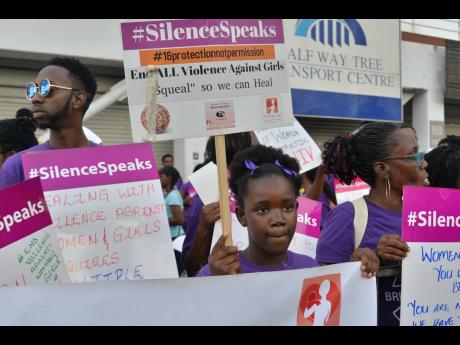Regional GBV workplace policy finalised by employer and labour bodies
THE CARIBBEAN region now has a policy to address gender-based violence (GBV) in the workplace.
Consensus on the policy was reached on Thursday when Wayne Chen, president of the Caribbean Employers’ Confederation (CEC); and Andre Lewis, president of the Caribbean Confederation of Labour (CCL), officially signed the document for the adaption of the Joint Policy Positions to Address Gender-Based Violence in the Workplace.
The policy position gives clear, practical guidelines on creating a safe environment for the confidential and appropriate handling of reports of GBV incidents, in addition to providing a framework for addressing challenges faced by survivors of GBV in the workplace. The joint initiative between the CEC and CCL is supported by the UNFPA and ILO under the Spotlight Initiative, with generous funding from the European Union to eliminate all forms of violence against women and girls (VAWG) in the world of work.
“This policy, developed with inputs from employers, employees and trade unions, will serve as a guide for employers to address GBV at two levels: primary prevention by informing employers and employees what GBV looks like, so it could be prevented before it occurs; and secondary prevention by protecting and reducing the risk of exposure to violence against women and girls,” Chen said following the document signing.
In her keynote address, Aurora Noguera-Ramkissoon, liaison officer, sub-regional office for the Caribbean, Trinidad and Tobago Liaison Office, UNFPA said: “We recognise that the workplace is an important and strategic place to disrupt family violence. Most people spend at least eight hours of the day at work. Workplaces can be safe zones not only for sharing prevention information, but also sharing information where survivors can obtain support services.”
Noguera-Ramkissoon continued: “Only together, through a multi-pronged approach, can we put an end to GBV. This joint policy provides an essential framework to ensure that anyone experiencing GBV, abuse or harassment in the workplace have greater access to coordinated support, including special leave, anonymous reporting, confidentiality and employee assistance programmes.”
At the online event, both presidents of the CEC and CCL officially signed the Regional Joint Positions to Address GBV at the Workplace, which will serve as a guide for the appropriate handling of report of GBV incidents, sexual harassment and promote survivors’ recovery.
“The CCL is honoured to be part of this historic moment where we officially place our signature to address Gender-Based Violence not only in the workplace but the wider communities and homes,” Lewis said.
The Regional Joint Positions to Address GBV at the Workplace agreed on by the CEC and the CCL, under the Spotlight Initiative, is a significant opportunity for employers, workers, and their representatives to create and shape workplace policies and cultures to efficiently address and eliminate GBV. More than 47 companies and 50 labour unions from 18 Caribbean countries contributed to the policy’s development during online workshops held in May and June.
The finalised policy is available at the Cipriani College of Labour and Cooperative Studies website.

